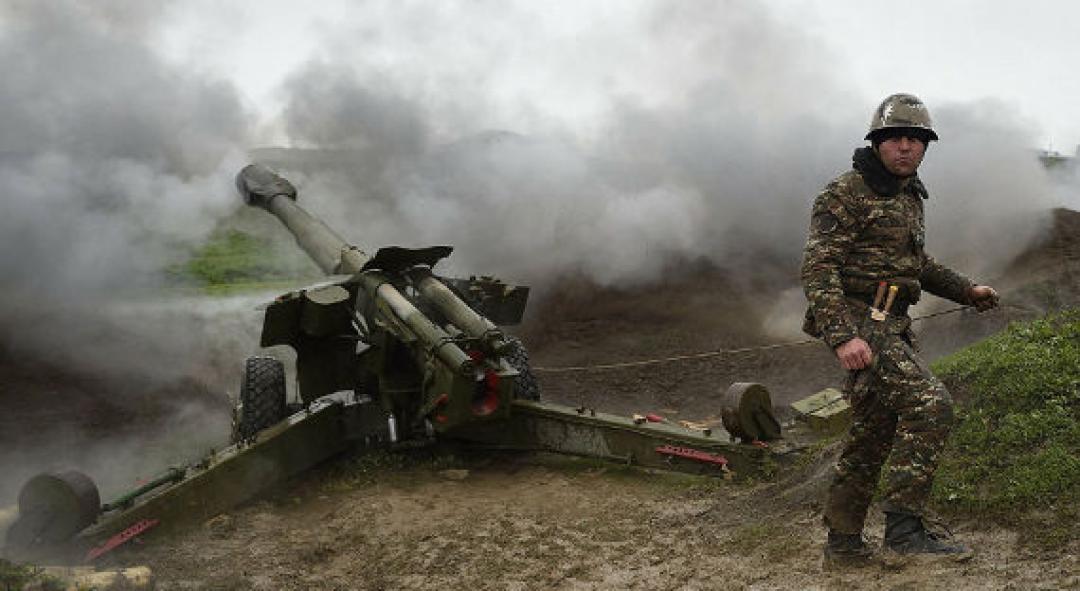
New war in Nagorno-Karabakh

Early in the morning on September 27, the Azerbaijani Ministry of Defense reported the massive shelling of Azerbaijani provinces along the ceasefire line in Nagorno-Karabakh using heavy artillery. According to the report, there were casualties among both civilians and the military. Subsequently, the Defense Ministry announced the launch of a counter-offensive along the entire front line by the units of the Azerbaijani army in order to stop the hostilities of the armed forces of Armenia and to ensure the safety of the civilian population.
Armenian Prime Minister Nikol Pashinyan announced that Azerbaijani armed forces had provoked the escalation and were launching an offensive in Nagorno-Karabakh. During his appearance in the Armenian parliament, Pashinyan was asked by representatives of the “Bright Armenia” party about the possibilities of recognizing Nagorno-Karabakh as an independent state in the current context. Pashinyan avoided a direct answer to this question.
The Ministry of Defense of Armenia stated that the Armenian armed forces had shot down several Azerbaijani helicopters and drones, as well as destroyed several tanks. The Azerbaijani Ministry of Defense rejected this claim.
Casualties
The spokeswoman for the Armenian Defense Ministry, Shushan Stepanyan, announced that 31 Armenian soldiers were killed and over 200 others injured during the military clashes. Azerbaijan, on the other hand, speaks of over 550 Armenian soldiers killed and significant damage in military material. It was also alleged that the S-300 air defense system in Nagorno-Karabakh was destroyed, which could significantly weaken the air defenses of the Armenian army in Nagorno-Karabakh.
As for Azerbaijan's military casualties, there are no clear official statements or exact death tolls, although Baku has officially admitted it suffered casualties. The press office of the Ministry of Defense of Azerbaijan only reported that one soldier was killed and that another has been lightly injured during the fighting. Armenia assumes that up to 200 enemy soldiers had been killed and injured.
Developments at the frontline
Around noon, the press office of the Azerbaijani Ministry of Defense reported the takeover of several villages in Nagorno-Karabakh: Garachanbeyli, Gervend, Goradis, Yuhari Abdurrachmali, Böyük Maryanli and Nuzgar in the provinces of Füsuli and Jebrail. In addition, according to the Azerbaijani Army, twelve anti-aircraft missile systems (“OSA”) of the Armenian air defense units in various regions were destroyed. Thereupon Azerbaijan's head of state Aliyev turned to the people and blamed Armenia for the worsening situation on the frontline. In his address to the people, Aliyev promised to do everything possible “to enable them to return to their home areas”.
The Armenian side has officially admitted the loss of control over territories in the south in the direction of Talysh without going into detail.
Situation of the civilian population
As for the civilian casualties, the Azerbaijan Prosecutor General said that an entire family of five was killed by the rocket attacks of the Armenian armed forces. So far, there has been talk of two civilians killed in Armenia. There are numerous wounded civilians on both sides: according to human rights officials, there are 19 wounded civilians in Azerbaijan and over 30 in Armenia. The situation for the civilian population is made more difficult by the fact that the Covid-19 pandemic has placed a heavy burden on both of the respective health systems in Armenia and Azerbaijan. Armenia in particular was hit hard by the epidemic, which is likely to result in delays in the treatment of war victims. In the meantime, the Armenian armed forces in Nagorno-Karabakh have started a fundraising campaign to support the military financially.
In addition, the conflicting parties accused each other of having carried out cyber attacks. According to the Armenian media, dozens of key news sites in the country have been temporarily shut down by Azerbaijani hackers.
In both Armenia and Azerbaijan, political parties and civil societies supported their governments. After the fighting in Nagorno-Karabakh came to a head, Armenia declared a state of war for the entire country. All Armenian men up to the age of 55 are mobilized. In the evening, President Aliyev also signed a decree declaring a state of war and introducing a curfew in Azerbaijan.
International Reactions
Russia, the OSCE Minsk Group, the EU Council President and the UN Secretary-General called on the conflicting parties to come to an immediate ceasefire. Armenia and Azerbaijan must return to the negotiating table. German Foreign Minister Heiko Maas commented on the escalation as follows: “The news of renewed, massive clashes between Armenia and Azerbaijan along the entire line of conflict alarm me. I call on both parties to the conflict to immediately stop all hostilities and especially the shelling of villages and towns.
The Ministry of Foreign Affairs of Turkey expressed solidarity with Baku and criticized the Armenian aggression. "We condemn in the strongest possible terms the Armenian attack on the Azerbaijani border, which claimed civilian victims and is a clear violation of international law." The British analyst Thomas de Waal speaks of Turkey as the " new factor“, which this time supports Azerbaijanis more openly than before. The reaction of Russia, the protector power of Armenia, is rather "ambiguous" because of Moscow's close ties with Baku, the analyst said. Pashinyan initiated a phone call with Russian President Vladimir Putin on September 27. Pashinyan also discussed the current situation in Nagorno-Karabakh with the French President Macron.
In the past few months there have been continued tensions in the longstanding conflict between Armenia and Azerbaijan. In July, dozens of military members died in an escalation on the interstate border in Towus, even though the actual conflict area is several hundred kilometers from the border. The last time there was fierce fighting between Armenia and Azerbaijan over Nagorno-Karabakh was in April 2016. More than 200 people died on both sides.
See Also


Armenia Records 5.9% GDP Growth in 2024, Missing 7% Goal

Yerevan Balances Strategic Ties with Both US and Russia, Says Foreign Minister

FM Mirzoyan: Peace Deal with Azerbaijan Is Within Reach

Pashinyan and Erdogan Hold Call, Reaffirm Commitment to Ongoing Dialogue

